This article will help you quickly compare and evaluate the best job costing software and accounting software for contractors and other job management software.
The process of job costing can be challenging. There’s a lot to consider! Job cost accounting software can simplify the process of gathering tallies for money being spent and earned. In this post, I’ll discuss job costing vs process costing and highlight a few of the best purchase costing tools.
The Top 10 Job Costing Software To Track Your Construction Projects
There’s a lot to consider when looking for a costing app. Check out the list below to get started. These are job costing tools, but if you’re looking for a more comprehensive system for tracking and managing construction projects, I’ll point you towards my overview of construction project management software.
The Best Job Costing System List
Here’s a shortlist of the best job-order costing tools:
- A-Systems – Best Software for Construction Accounting
- Bauwise – Best cloud-based job costing software
- Cleopatra Enterprise – Best job costing software for EPC firms in the process industry (oil & gas, chemical, mining)
- PrioSoft – Best for mixed-OS offices (PC, MacOS, Chromebook)
- Fizure – Best job costing software for construction
- Coconstruct – Best job costing software for builders and home remodelers
- Tradify – Best job costing software for contractors
- Housecall Pro – Best for automatic scheduling & dispatch
- Knowify – Best job costing software with mobile app (Apple & Android)
- Quoter – Best job costing software for enterprise and large teams
Overviews Of The 10 Best Job Costing Software
Here’s a brief description of the costing and accounting software for construction featured on this top 10 list.
1. A-Systems – Best Software for Construction Accounting
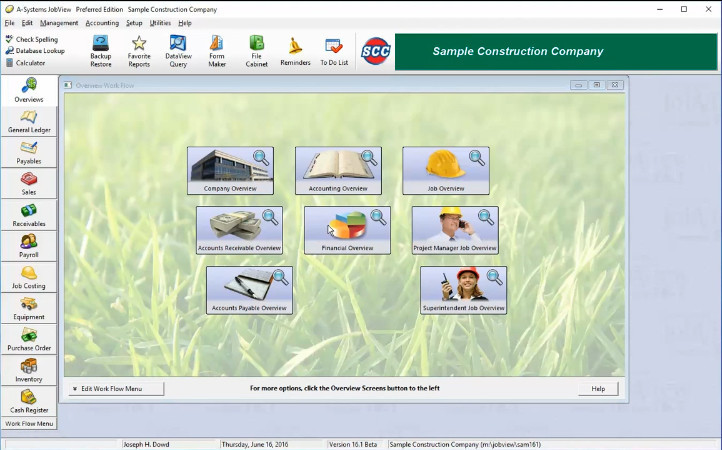
A-Systems is widely recognized for its comprehensive approach to managing the multifaceted accounting needs specific to the construction industry. The tool does not merely address general accounting; it digs deeper into the niche of construction, thus making it particularly apt for construction accounting, ensuring projects remain on budget and financial workflows are streamlined.
Why I Picked A-Systems:
In the realm of numerous accounting tools, I chose A-Systems due to its tailored approach towards construction-specific financial management. The software clearly delineates itself from generic accounting tools by honing in on the intricacies and unique financial workflows intrinsic to construction projects. This dedication to addressing the particularities of construction accounting is what propels it to be the best for this segment.
Standout Features & Integrations:
A-Systems pivots around an inclusive feature set, aimed at managing not only primary accounting but also project costing, payroll, and comprehensive reporting, thus providing a 360-degree financial overview for construction projects. The ability to seamlessly handle job cost accounting, retainage tracking, and offering a dedicated module for contractors anchors its position in construction-centric financial management.
In terms of integrations, A-Systems provides critical connections with various industry-standard applications, ensuring that your financial data can easily intermingle with project management and CRM tools. Integration with tax software and compatibility with prevalent construction management tools ensures that data flows cohesively across all platforms, reducing manual data entry and ensuring consistency in financial records across all business units.
Pricing:
Pricing upon request
Pros
- Easy to Learn
- Customizable Reports
- Payroll
Cons
- No service dispatch
- No mobile app
2. Bauwise – Best cloud-based job costing software
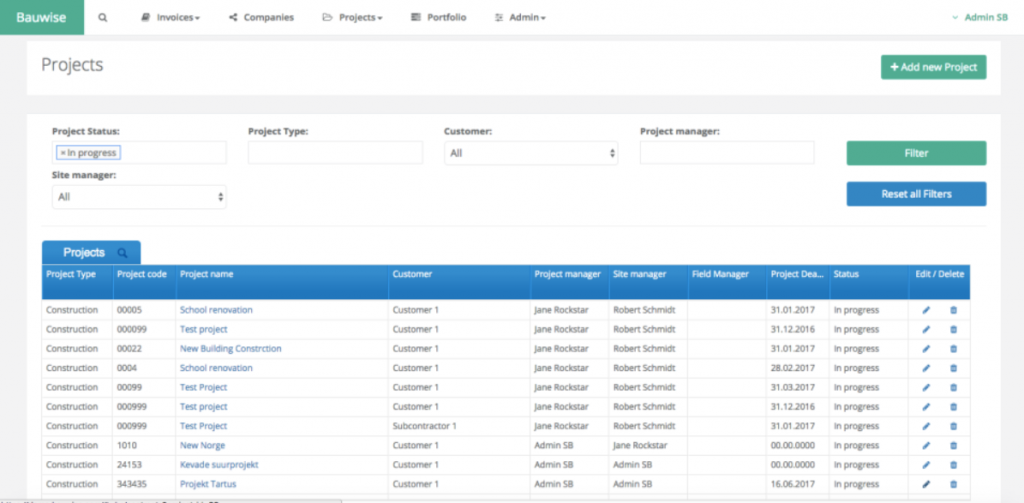
Bauwise provides a platform specifically crafted to assist businesses in managing project financials by keeping a keen eye on job costing, ensuring that every facet of a project stays within budget. It emerges as best for cloud-based job costing owing to its targeted functionality that enables companies to easily track project expenditures, linking actual costs with initial budgets and providing a detailed analysis of any discrepancies or overruns.
Why I Picked Bauwise:
I chose Bauwise for its proficient ability to afford businesses a lucid view of their project financials in real-time, which is pivotal for maintaining budget control and ensuring financial success. Its capacity to integrate project costs with budget allocations and provide meticulous financial reporting elevates its position amongst competitors and underpins its proficiency in managing job costing in a cloud-based format. Thus, it aligns effectively with the needs of businesses seeking a potent solution to manage and analyze project expenditures against initial budgets, particularly in a cloud-based setting.
Standout Features & Integrations:
Bauwise excels in providing pertinent features such as real-time budget tracking, where it draws direct comparisons between actual costs and budget allocations, and in-depth financial reporting, which furnishes businesses with crucial insights into project financials. Moreover, its dashboard visualization of costs, budgets, and financial status ensures that stakeholders can quickly comprehend and act upon financial data without needing to delve into complex reports.
In terms of integrations, Bauwise offers vital connections with accounting software like QuickBooks, providing a synchronized environment where financial data is consistently accurate and up-to-date across all platforms. Furthermore, its ability to integrate with Microsoft Excel allows for enhanced data manipulation and reporting, offering businesses additional flexibility in how they interact with and analyze their financial data.
Pricing:
Pricing upon request.
Pros
- Get one project free
- Cost-to-completion tracking
- Portfolio management options
Cons
- Accounting integration costs extra
- Charges per active project
- No customizable templates
3. Cleopatra Enterprise – Best job costing software for EPC firms in the process industry (oil & gas, chemical, mining)
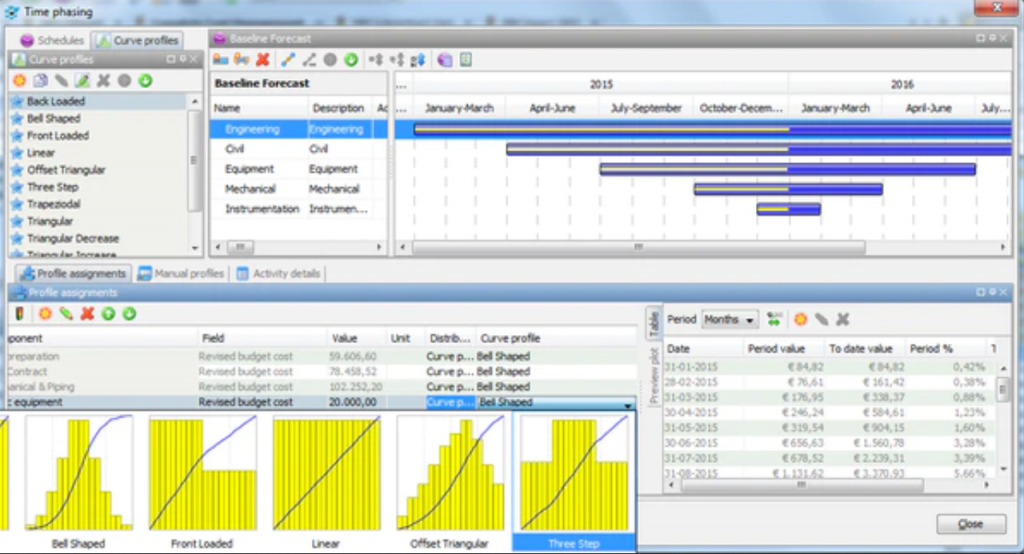
Cleopatra Enterprise provides a robust suite for total cost management, strategically tailored to meet the intricate needs of Engineering, Procurement, and Construction (EPC) firms operating within the complex realms of the process industry, including sectors like oil & gas, chemical, and mining. The software fortifies firms with an array of functionalities that span estimating, project controls, and benchmarking, thus ensuring thorough oversight and strategic management of project costs, which directly aligns with the nuanced demands of EPC entities in the aforementioned industries.
Why I Picked Cleopatra Enterprise:
I chose Cleopatra Enterprise due to its comprehensive approach to managing all facets of project costing, especially within the context of EPC firms. The software’s adept capability to facilitate precise cost estimating, thorough project controls, and insightful benchmarking particularly drew my attention. In the expansive and often volatile domain of the process industry, where EPC firms are constantly navigating intricate project landscapes, Cleopatra Enterprise emerges as a vital ally by providing detailed, industry-specific costing insights, therefore substantiating its stance as the best job costing software for EPC firms in the process industry.
Standout Features & Integrations:
Cleopatra Enterprise excels with features like detailed cost estimating, which enables firms to create accurate and detailed cost estimates that effectively encompass all conceivable variables, thereby ensuring financial strategies are well-founded and reliable. Moreover, the software delivers a project controls feature that allows for the in-depth monitoring, adjustment, and management of all project costs, thereby ensuring that financial trajectories align with strategic objectives. Additionally, Cleopatra offers a benchmarking feature, providing firms the ability to compare and contrast current projects with past endeavors, thereby fostering continuous improvement and strategic refinement.
In terms of integrations, Cleopatra Enterprise supports data exchange with various other software solutions, ensuring that firms can effectively synchronize data across multiple platforms. This includes compatibility with ERPs, 1D/2D/3D estimating tools, and scheduling tools like Primavera P6 and Microsoft Project, which facilitates a holistic and interconnected approach to project management and costing.
Pricing:
Pricing upon request
Pros
- Comprehensive and flexible costing solution
- Productivity measuring
- Simple reporting dashboard
Cons
- No MacOS support
- Complex interface shows a lot of granular information
4. PrioSoft – Best for mixed-OS offices (PC, MacOS, Chromebook)
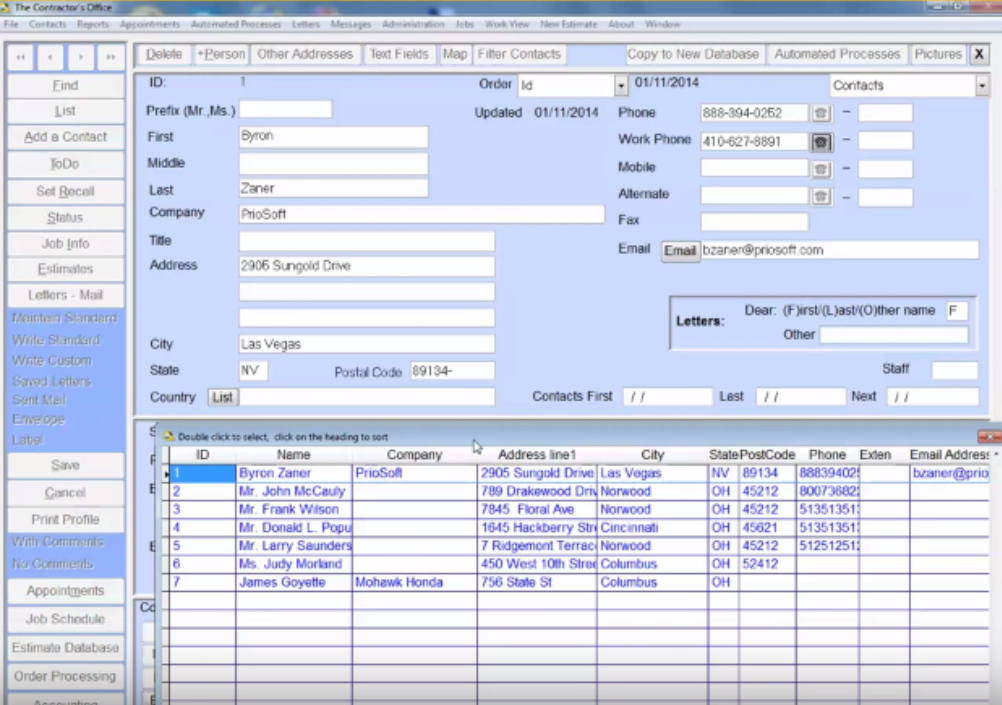
PrioSoft offers a solution that effectively aids in managing construction and contractor businesses by handling aspects like cost estimating, project management, and customer relationship management. Notably, it acknowledges the diverse operating systems utilized in various office environments, making it a plausible pick for settings that incorporate PC, MacOS, and Chromebook.
Why I Picked PrioSoft:
In my search for an inclusive tool that caters to diverse technological environments, I chose PrioSoft for its inherent capability to function across various operating systems. I discerned that within the space of contractor management tools, PrioSoft offers a certain level of technological flexibility that is often rare, recognizing its potential to integrate effortlessly into mixed-OS offices without imposing additional IT burdens. This element of compatibility underscores why it stands out as the best for offices employing a mix of PC, MacOS, and Chromebook.
Standout Features & Integrations:
PrioSoft facilitates meticulous cost estimating and detailed project management, ensuring businesses can produce accurate quotes and manage projects with refined precision. The tool offers a Customer Relationship Management (CRM) module, allowing businesses to keep detailed customer records and manage relationships proactively. In terms of integrations, PrioSoft does not isolate itself; it provides compatibility with QuickBooks, ensuring financial data can flow between platforms without necessitating manual data entry. Moreover, it enables integrations with various project management tools, ensuring that information relating to tasks, resources, and scheduling is consistently synchronized and accessible across platforms.
Pricing:
Pricing upon request.
Pros
- Good mobile app
- Great live online training
- Comprehensive purchase order management
Cons
- No bills of material or change orders
- No offline access
5. Fizure – Best job costing software for construction
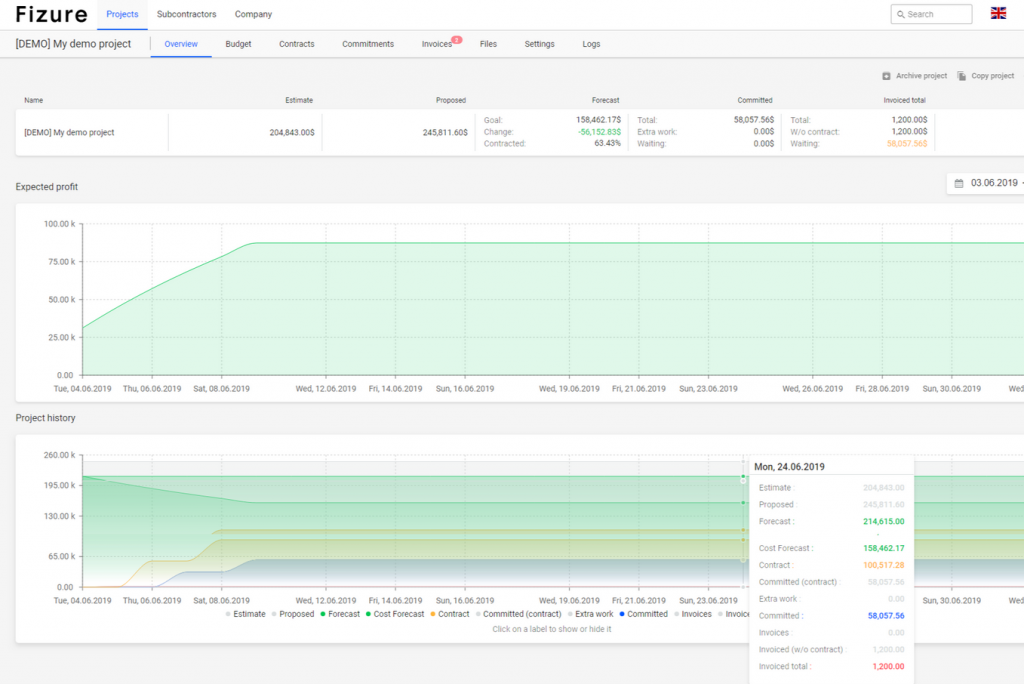
Fizure facilitates a practical approach to job costing for construction projects, providing an organized interface to track expenses, manage budgets, and streamline financial workflows. Particularly beneficial for construction purposes, it offers a sturdy, focused platform to manage the multitude of financial transactions, and varied costing needs inherent in the construction sphere, thereby substantiating its stance as best for construction job costing.
Why I Picked Fizure:
I picked Fizure after a critical evaluation of various tools and considering its specialized capabilities tailored for the construction industry. It caters distinctively to the specific nuances of job costing within this sector, ensuring precise budget tracking, effective cost management, and proficient handling of financial aspects from project inception to completion. My selection roots in its proficiency to adeptly manage complex and multifaceted financial data, ensuring transparency, accuracy, and a structured approach to construction project financing.
Standout Features & Integrations:
Fizure encompasses features that provide substantial support in tracking and managing costs, such as detailed cost tracking, comprehensive budget management, and exhaustive financial reporting, which are crucial for maintaining financial integrity in construction projects. Furthermore, the tool offers a structured framework for change order management, ensuring all alterations are accurately recorded and financially accounted for.
Integrations in Fizure substantiate its utility by providing a cohesive work environment. The software integrates with popular accounting tools and ERPs, ensuring financial data flows consistently and accurately through all pertinent business systems. Additionally, it offers integration with project management software, ensuring all financial data aligns accurately with project timelines and resource management, maintaining a harmonized operational and financial workflow.
Pricing:
Pricing upon request.
Pros
- Simple, intuitive interface
- Upload expenses via mobile apps
- Has Outlook add-in
Cons
- Per-project pricing
- No time tracking for costs
6. CoConstruct – Best job costing software for builders and home remodelers
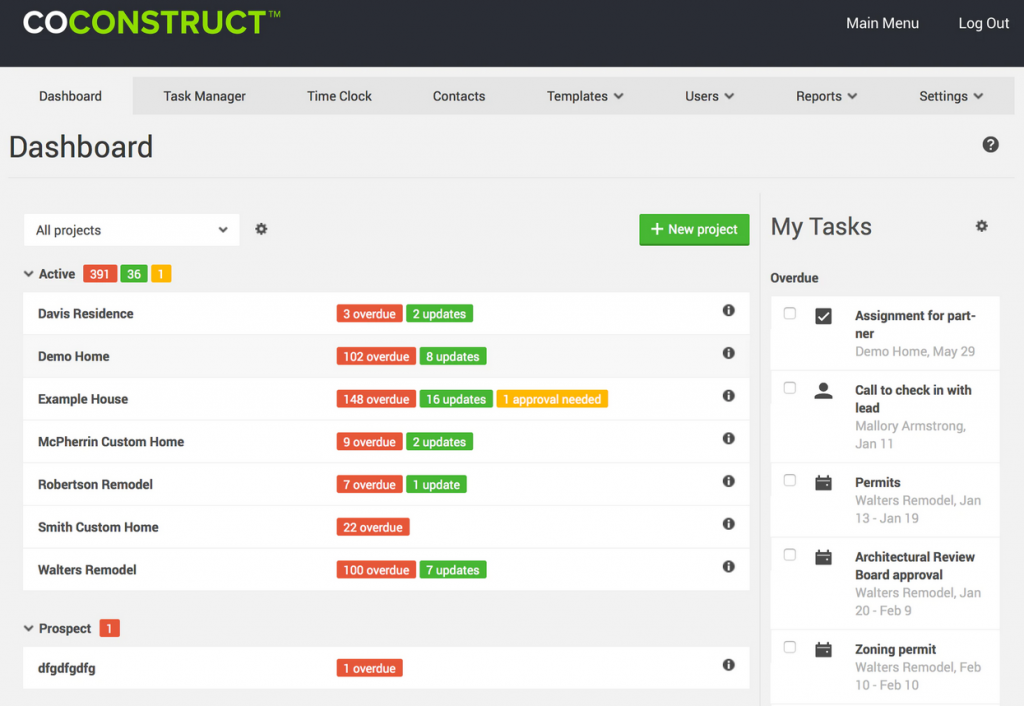
CoConstruct furnishes builders and home remodelers with an integrated platform to manage projects, finances, and client interactions seamlessly. Tailored to accommodate the specific needs of builders and remodelers, its adept capabilities in job costing ensure accurate, reliable financial management in every project phase, affirming its stance as a prudent choice for those within this industry.
Why I Picked CoConstruct:
I selected CoConstruct after thoroughly examining various platforms, appreciating its robust financial tracking and precise job costing features. This tool remarkably offers specific utilities that cater to builders and remodelers, from initial estimate phases through to project completion, thus supporting informed financial decisions and ensuring projects remain within budget. In my analysis, CoConstruct distinctly demonstrated a commitment to providing comprehensive financial oversight, particularly in job costing, validating it as the optimal choice for builders and home remodelers seeking precise, reliable financial management in their projects.
Standout Features & Integrations:
CoConstruct brings to the table crucial features such as detailed estimate creation, budget tracking, and client communication tools, which not only aid in maintaining financial control but also foster transparent client interactions throughout the project. The platform enables users to create, modify, and manage budgets, change orders, and invoices within a single unified space, simplifying the financial management process.
In terms of integrations, CoConstruct aligns with popular accounting software like QuickBooks, thereby enabling synchronized financial management across platforms and ensuring that job costing, expenses, and overall financial data remain consistent and updated. Additionally, it facilitates integrations with various CRM systems, thus ensuring customer data flows smoothly between sales and project management functions.
Pricing:
From $299/user/month (billed annually)
Pros
- Good integration with Quickbooks
- Great CRM features
- Mobile time entries
Cons
- No search capabilities for customers
- No submitting variations via phone
7. Tradify – Best job costing software for contractors
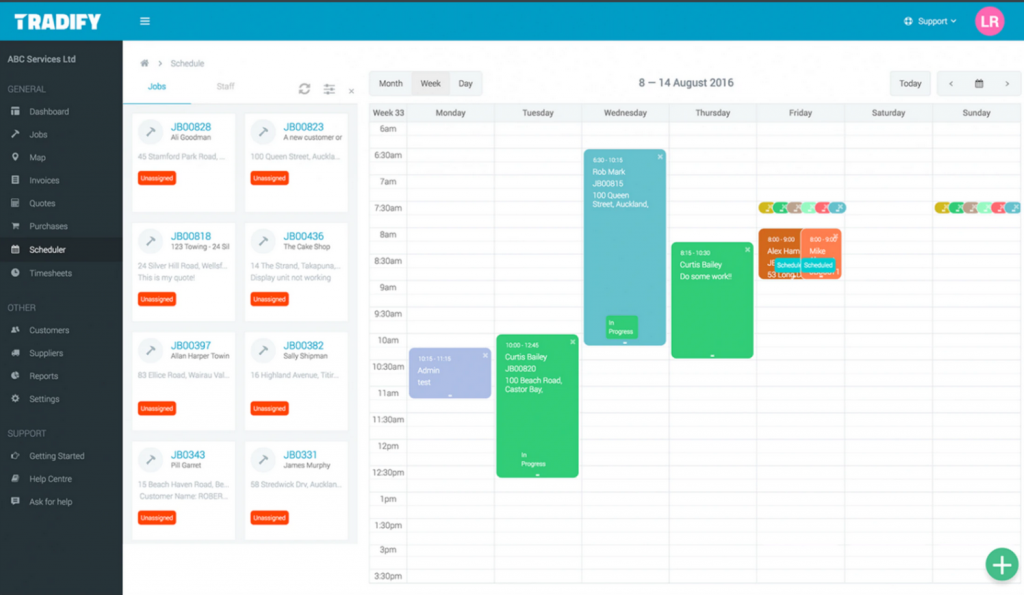
Tradify is fundamentally designed to address the nuanced requirements of contractors, especially concerning job costing. Its focus on providing straightforward, reliable job costing features makes it suitable for contractors aiming to manage and review financial aspects of projects effectively.
Why I Picked Tradify:
In the journey to select a tool that brings tangible value in job costing for contractors, I thoroughly evaluated Tradify, juxtaposing its features and usability against numerous other tools. This platform not only facilitates precise job costing but also adheres to the pragmatic needs of contractors, helping them navigate through budgeting, expense tracking, and financial planning of projects efficiently. I determined that its emphasis on specific contractor needs, particularly in aiding them to avoid exceeding budgetary limits and ensuring profitability, significantly positions Tradify as the best for job costing software in this context.
Standout Features & Integrations:
Tradify excels in offering features that are critical for detailed job costing, including detailed expense tracking, budget management, and financial reporting, which are imperative for contractors to maintain a financially stable operation. The software supports detailed cost breakdowns for every job, allowing contractors to navigate through the financial intricacies of their projects with accurate and detailed insights. Moreover, the tool aids in avoiding budget overshoots with its meticulous and straightforward cost tracking and reporting capabilities.
Integration-wise, Tradify provides critical connections with accounting software such as Xero and QuickBooks, enabling contractors to have streamlined financial management across all their operations. These integrations ensure that financial data flows consistently across platforms, thereby ensuring accuracy and reliability in financial reporting and analysis.
Pricing:
From $25/user/month, Tradify offers its services, supporting contractors in their journey towards precise and manageable job costing. No additional base fee per month or setup fees apply, making it a straightforward pricing model suitable for businesses of various sizes. The tool also provides an option for an annual plan, ensuring flexibility in payment and plan selection for different businesses.
Pros
- Modest per-user price
- Feature rich job costing tools
- Solid service dispatch features
Cons
- No client portal for quoting
8. Housecall Pro – Best for automatic scheduling & dispatch
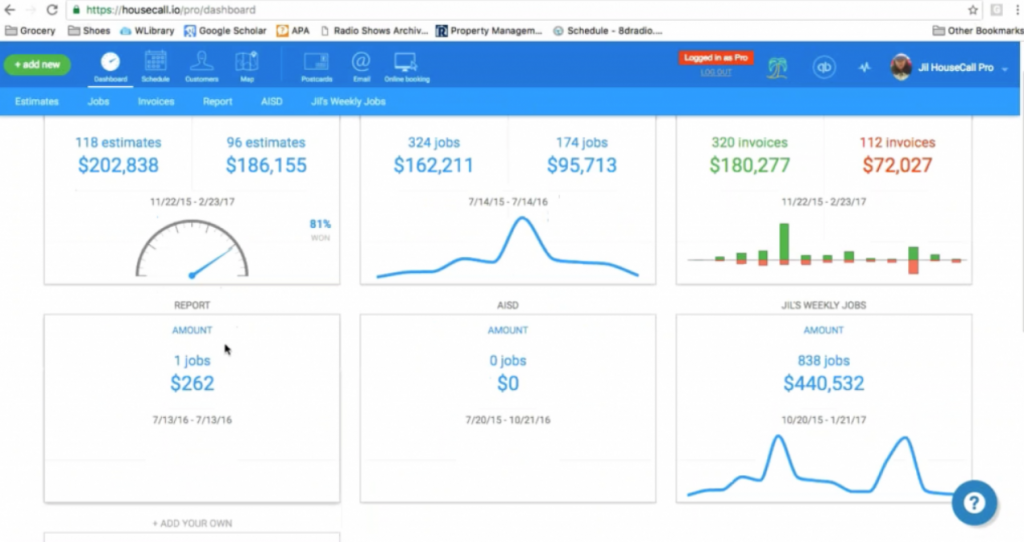
Housecall Pro is a comprehensive tool designed to streamline various aspects of HVAC business operations, notably in scheduling and dispatching. Its automated functionalities in these areas drastically reduce manual intervention, ensuring that technicians are optimally scheduled, and jobs are dispatched efficiently, supporting the claim that it is best for automatic scheduling and dispatch.
Why I Picked Housecall Pro:
In the process of examining various tools, Housecall Pro captivated my attention with its adept ability to minimize manual scheduling and dispatching tasks through automation. My selection leans heavily on its capacity to simplify the intricate and often time-consuming process of assigning and dispatching jobs to technicians, especially in a field where swift and efficient scheduling is paramount. The tool manifests its robustness by automatically allocating resources and technicians in a manner that adheres to both customer needs and organizational logistics, thereby substantiating its role as a leader in automatic scheduling and dispatch.
Standout Features & Integrations:
The crucial features that elevate Housecall Pro include automated scheduling, which proficiently assigns and organizes job appointments without manual input, and smart dispatching that strategically allocates technicians based on their skill set, location, and other pertinent factors. Furthermore, the customer communication feature ensures that clients are consistently in the loop about their appointments, job progress, and any potential changes, fostering transparency and trust.
On the integration front, Housecall Pro provides crucial connections with various popular applications and platforms to ensure that businesses can maintain their preferred workflows. Notable integrations include QuickBooks for financial management and synchronization of transaction details, Google Calendar for enhanced scheduling visibility, and Zapier, which enables the tool to connect with hundreds of other applications, facilitating data transfer and operational congruity across platforms.
Pricing:
From $65/user/month (billed annually)
Pros
- Can message business ventures right in the app
- Helpful text reminders
- Intuitive layout
Cons
- Need a better way to pull reports
- More invoice customization options would be great
9. Knowify – Best job costing software with mobile app (Apple & Android)
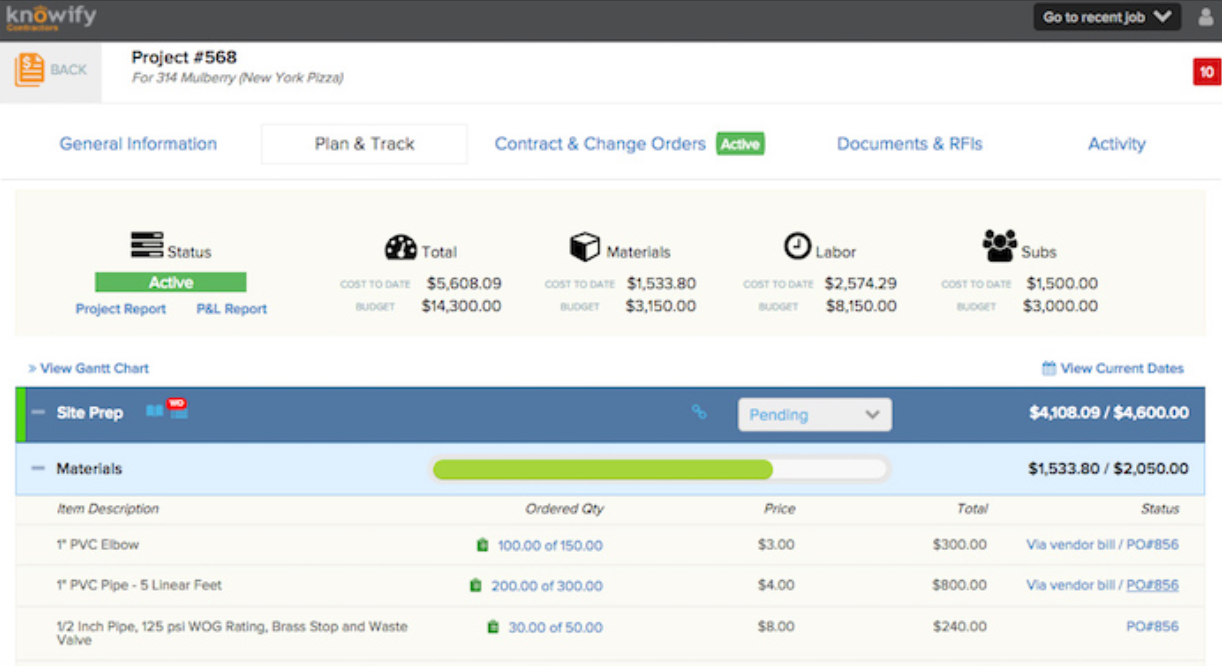
Knowify offers comprehensive job costing solutions particularly tailored for contractors and construction businesses, ensuring precise and efficient management of project financials directly from your mobile device. Its compatibility with both Apple and Android mobile applications underscores its utility for providing real-time access to job costing data, thereby substantiating its designation as best for job costing with mobile app functionality.
Why I Picked Knowify:
In my pursuit to find a tool that adeptly blends functionality with mobility, Knowify stood out, presenting itself not just as a software but as a versatile tool catering to both desktop and mobile users in the construction industry. I noticed its nuanced approach to job costing, providing features that allow contractors to track labor costs, materials, and other expenses directly through their mobile app, which is a significant differentiator in ensuring on-the-go accessibility and management. Thus, considering its specific alignment with the niche requirements of job costing while facilitating real-time mobile access, it affirms its position as the best for businesses necessitating mobile interoperability in job costing software.
Standout Features & Integrations:
Knowify brings to the table a suite of compelling features, notably its detailed job costing capabilities which empower users to not only track but also forecast costs, ensuring projects remain financially on track. The software also facilitates real-time communication between field and office, offering an efficient conduit to relay pertinent job information, updates, and alterations swiftly, thereby reducing lags in decision-making and operational adjustments.
The software integrates comprehensively with QuickBooks, an essential attribute that enables synchronized financial management and smoother accounting workflows. Moreover, its compatibility with GPS tracking tools and other project management software ensures that businesses can integrate Knowify into their existing technological ecosystem, ensuring that data flow remains unhindered and centralized.
Pricing:
From $68/user/month, Knowify provides access to its comprehensive suite of features designed to streamline job costing and overall project management. It’s worth noting that this pricing is applicable for their “Plus” plan, with other plans available that cater to varied business needs and financial allowances, and the potential for additional costs contingent upon the specific requirements and scale of a business’s operations.
Pros
- 2-way sync with QuickBooks
- Good budget and bidding
- Handy sub-client feature
- Great YouTube tutorials
Cons
- Client address look-up can be cumbersome
- Reporting templates aren’t as customizable as they could be
10. Quoter – Best job costing software for enterprise and large teams
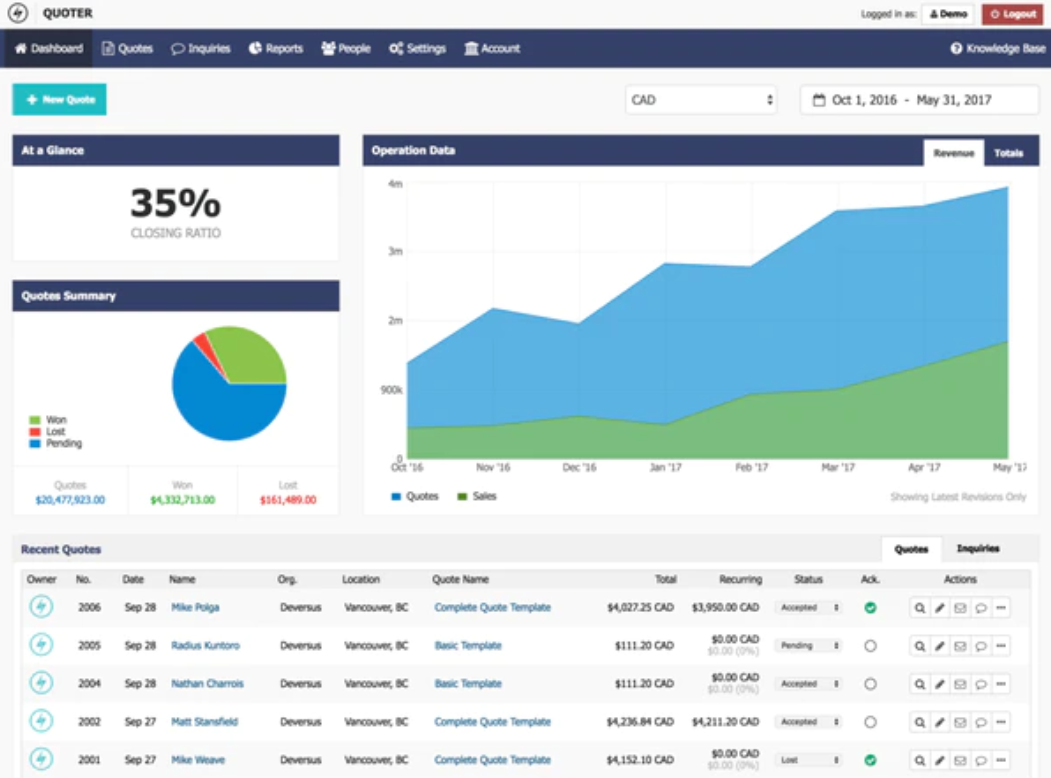
Quoter, a powerful job costing software, provides large teams and enterprise-level operations with advanced, scalable features to streamline and automate the estimation and quoting process. Catering specifically to the complexities and scale of larger organizations, it introduces a precise and efficient approach to job costing, aligning with the multifaceted demands of large team coordination and enterprise resource management.
Why I Picked Quoter:
I selected Quoter due to its robust capability to handle the extensive and intricate job costing needs of larger teams and enterprises. The software embodies a meticulous approach to cost estimation, ensuring that organizations can create detailed, accurate quotes that encompass all variables, which is pivotal for large teams managing multiple projects simultaneously. Its comprehensive feature set and notable integrations have established it as a staple for enterprises, enabling not just detailed job costing but also fostering a streamlined workflow from quote creation to approval.
Standout Features & Integrations:
Quoter brings to the table a range of comprehensive features, such as automated quote generation, customizable templates, and a structured approval process, all of which underpin an efficient, scalable quoting workflow. The tool provides an accessible interface, facilitating ease in creating, sending, and tracking sophisticated quotes, which proves to be invaluable for large teams managing numerous projects. Furthermore, the software enables teams to collaborate on quotes, ensuring all relevant costs and variables are accounted for, thereby enhancing accuracy and reliability in the job costing process.
In terms of integrations, Quoter extends its functionality by linking with numerous other business tools. Notable integrations include those with CRM systems, such as Salesforce and HubSpot, enabling a seamless flow of data between customer management and job costing. Additionally, it integrates with various payment gateways, including Stripe and PayPal, and productivity tools such as Slack, which can facilitate immediate communication regarding quote updates or approvals within large team environments.
Pricing:
From $30/user/month (min 2 seats)
The pricing for Quoter starts at $30 per user per month, with a requirement for a minimum of two seats, ensuring that even smaller subsections of large teams can utilize its functionalities efficiently. This tier of pricing offers access to a robust set of features, ideal for teams and enterprises that require reliable, comprehensive job costing capabilities without entering a prohibitively expensive pricing tier.
Pros
- Great proposal templates
- Built in e-signature
- Quick onboarding and launch
Cons
- Limited tool customization
- No way to add sections on the fly
Other Contractor Accounting Software Options
Here are a few more that didn’t make the top list. If you need additional suggestions for handy job costing accounting, check these out.
- Quotient – Best job costing software for small business
- Jobber – Best project management software for home service small businesses
- BidBuilder – Best simple construction business costing solution
- CUC Software – Best for HVAC industry service management
- Buildxact – Best software suite dashboards to quickly track progress
- PlanGrid – Best for real-time collaboration on purchase orders and proposals
- SYNCHRO – Best customizable task- and model-based digital workflows for the job costing lifecycle
- Goldenseal – Best job costing solution for construction specialists (architects, painters)
- Premier – Best SaaS for progress billing and T&M billing software system
- Explorer – Best data entry streamline, with OCR scraping and GPS tagging
- Procore – Best construction software with open API
- Aroflo – Best construction management software for small trades
- Synerion – Best time tracking software solution for construction companies
- Joblogic – Best productivity tools for construction
- Visual EstiTrack – Best for user-friendly invoicing and cash flow interfaces
- Shoptech – Best provider of packing slips, bills of lading, and shipping labels for any construction job
- SimPRO – Best cost control software for labor costs and supplies
- 3C Software – Best business management software for simulations to test changes
- BigTime – Best job costing software for fast billing options (WIP, drafts, billing rates, cost rates, rules)
- Core – Best job costing software for legal, engineering, architecture, and accounting firms
- Candy CCS – Best scalable job costing management solution
- Hexagon PPM – Best job costing software with construction project portfolio management (PPM)
- ProBuilder Online – Best job costing software for QuickBooks integrations on any pricing plan
- ComputerEase – Best software for flexible ERP reporting
Job Cost System FAQs
Have some questions about internal costing? Check out this handy FAQ.
What Is Job Costing?
Job costing brings together the costs of materials, labor, and any other expenses for a particular job. Job cost accounting will track these various costs along with any revenue to determine the profitability of the said job.
What Is a Job Costing Software?
Job cost software organizes the different costs within a job into categories for control purposes. This type of software can help determine profitability, report ongoing costs, and manage invoices and expenses.
What Is a Job Cost Sheet?
A job cost sheet is a document, either physical or digital, that records the costs associated with a specific job.
Job Costing Software Comparison Criteria
Choosing the ideal job costing software warrants a nuanced exploration into various aspects that influence user experience, functionality, and overall impact on organizational workflows. Here’s a summary of my evaluation criteria:
Core Functionality
- Detailed Cost Estimations: Ability to provide intricate and comprehensive cost breakdowns, covering all potential expenses and variables in a project.
- Cost Tracking: Continual tracking of actual expenses against estimated costs to manage budgets effectively.
- Reporting: Capability to generate detailed, insightful reports that facilitate informed decision-making.
- Quote Management: Management and automation of quote creation, sending, and tracking, ensuring a streamlined client communication process.
Key Features
- Automation Capabilities: Minimize manual inputs, enhance accuracy, and save time by leveraging automated features for functions such as data entry and quote generation.
- Multi-Project Management: The ability to handle numerous projects simultaneously, ensuring that each project can be tracked and managed effectively without compromise.
- Customization: Enables the tailoring of templates, reports, and estimations to reflect the unique needs and branding of your organization.
- Approval Workflows: Facilitates the establishment of structured approval processes to ensure that all quotes and costings are validated through defined organizational hierarchies before client communication.
Usability
- Intuitive Interface: Look for software that provides a user-friendly, intuitive interface, ensuring that users can navigate and utilize features with minimal friction and learning curve.
- Collaborative Features: The platform should facilitate collaborative working, with features that enable multiple team members to contribute to, modify, and approve job costing estimations and quotes.
- Customer Support: Robust, accessible customer support that is available through multiple channels (such as live chat, email, and phone) to assist users in resolving issues promptly.
- Learning Resources: Availability of comprehensive learning materials, including guides, tutorials, and FAQs, to facilitate user onboarding and continuous learning, ensuring users can extract maximum value from the software.
Project Manager News is reader-supported. We may earn a commission when you click through links on our site — learn more about how we aim to stay transparent.
Summary
Navigating through the myriad of options in the construction job costing software market demands a meticulous approach, focusing on the unique demands and workflows of the construction sector. The intricacies of construction projects, which involve numerous variables, job phases, and resource management complexities, necessitate a tool that can adeptly handle these specifics while providing clear, precise cost estimations and reporting. Thus, identifying a solution that intertwines reliability, functionality, and scalability with the nuanced needs of construction management is pivotal.
Key Takeaways
- Comprehensive Cost Management
Select software that offers extensive cost management features, ensuring it can accurately account for all possible variables in construction projects. This includes detailed cost estimations, tracking of actual costs against estimates, and in-depth reporting to enable accurate, data-driven decision-making throughout the entirety of a project. - Scalability and Flexibility
Choose a tool that not only meets your current needs but also has the capacity to grow with your organization. Scalability in features, user access, and project handling, alongside the flexibility to adapt to various project types and sizes, ensures that the software remains a robust, reliable asset as your construction business evolves. - Seamless Integrations
Look for software that provides integrations with other crucial business tools used within your construction firm. Whether it’s integrations with accounting software, project management tools, or CRM systems, ensuring data can flow seamlessly between platforms is vital to maintaining an efficient, error-minimized workflow throughout the entirety of a construction project.
By adhering to these key takeaways and prioritizing comprehensive cost management, scalability, and seamless integrations, the path to selecting the ideal construction job costing software becomes clear and purpose-driven. This focus will underpin the successful implementation of a tool that not only simplifies and enhances the job costing process but also fortifies the overall project management and financial planning within your construction firm.
What Do You Think About These Cost Accounting Systems?
Have you tried out any of the construction accounting software listed above? Which cost accounting system do you like best? Do you use different software for process costing vs job costing? Is there a construction estimator that we’ve missed that you think we should add to the list? Let us know in the comments.
Related Read: The 10 Best Free Construction Project Management Software